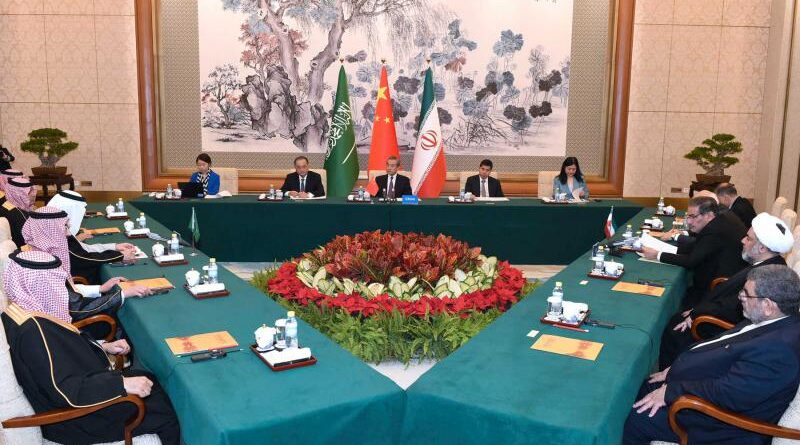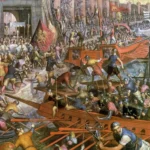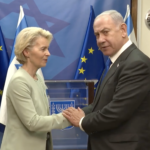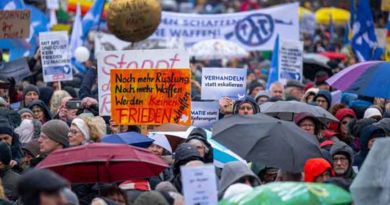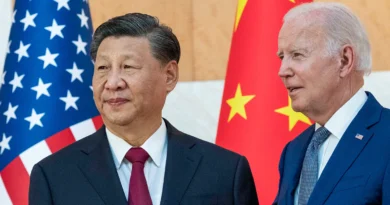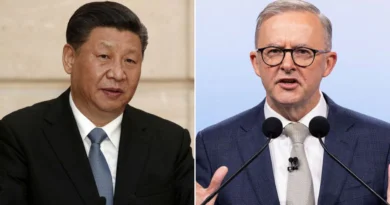A new multipolar Middle East
JAVIER GARCIA
The agreement between Iran and Saudi Arabia, sponsored by China - which could also put an end to the war in Yemen shortly - is an event of special historical relevance and a clear example of how conflicts can be resolved in a multipolar world not constrained by the designs of a single hegemonic power. A model that they were certainly not used to in the region.
China has emerged, to everyone's surprise, as the mediator that the Middle East needed. Something that for the United States, clearly aligned with one of the sides, has become totally impossible.
We had been witnessing Washington's meddling in the conflicts in the region for more than 20 years. From Lebanon to Yemen, passing through the war in Syria, the one in Libya or the increasingly desperate Palestinian situation.
A period that clearly shows how US foreign policy has been dedicated to pursuing its uncertain objectives, regardless of the damage it could cause.
The commemoration of the 20th anniversary of the war in Iraq reminds us of the terrible balance of the devastation of a country: close to 200.000 deaths, 9 million displaced persons, innumerable physical and psychological consequences, the proliferation of armed groups, an oil nation impoverished with problems to even maintain the electricity supply, once a leader in education and health in the region and now far behind its neighbors.
The conversion of Iraq into a virtual failed state is the living example of the tremendous failure of the unipolar global order promoted by the United States since the end of the cold war.
It is difficult to find any benefit from the almost 20 years of war in Iraq, even for the US which, after causing a colossal tragedy and spending billions of dollars, has failed to improve its security one iota, much less its image in the region.
It is also difficult to find any progress in the dramatic evolution of the Palestinian conflict, the devastation of Yemen, Syria or Libya or the situation in Lebanon and Egypt.
Conflicts that have evolved under the perennial American rhetoric of expanding freedom and democracy. A narrative that, however, has not shown any qualms about choosing Saudi Arabia as its primary ally in the region.,a of thethe nations least democratic on the planet. While other countries such as Iran are demonized, with surely authoritarian elections and procedures, but much more democratic than the Riyadh regime, about guinea piga infringement of the human rights we never hear Washington speak.
La obsession of the USA to choose winners and losers anywhere in the world where the focus is, to divide the countries between rewarded and punished, of promoting confrontation instead of cooperation, has brought us to a chaotic and deranged planet on the brink of collapse.
and in those appears China, with its millennial diplomacy and its doctrine not to interfere in the internal affairs of others, de not take sides with any of the parts. With his strange idea of establishing mutually beneficial trade relations with all countries instead of hegemonic ones. With its tradition of oriental thought of harmonious coexistence between people and peoples.
It is not surprising that the region, accustomed to very different attitudes, welcomes Chinese diplomats with open arms.
The Chinese head of state, Xi Jinping, himself became personally involved in the mediation by traveling to Saudi Arabia in December - his only visit abroad in months - and receiving Iranian President Ebrahim Raisi in Beijing in February.
"We have no interest in geopolitical competitions or in filling any vacuum left in the region," said the top representative of Chinese foreign policy, Wang Yi, during the signing of the agreement to restore relations between the hitherto staunch enemies.
It is an agreement without Western participation that has altered the dynamics of global politics. Which offers non-Western solutions to non-Western problems in the face of the chaos caused by the "rules-based order" in force on the planet since the end of the Second World War.
An understanding of the Global South, which is not based on revenge, rancor or resentment. If not in the conviction that the disorder of the "order based on rules" has exceeded all limits and its replacement with alternative models of relations between nations is urgent.
The pact exemplifies the realization of a new multipolar order based on dialogue that respects the integrity and will of each country, whether in the Middle East or in any other region of the world.
Riyadh has sent a clear sign that it has diversified its strategic alliances according to its national and regional interests, together with the expression that it no longer trusts the unipolar order managed by Washington and operates in a multipolar context.
The adversity between Saudi Arabia and Iran, which had festered to the extreme in recent years, was influencing various regional conflicts, from Yemen to Syria to Iraq. Each sided with different warring parties, and both fought through proxy wars with their neighbors, moving ever closer to open direct war between them. The restoration of their relations is wonderful news, which opens a hopeful window for the progressive resolution of these conflicts. And it also sets a positive precedent for the Israeli-Palestinian conflict.
Chinese mediation shows the constructive role that powers can play in the Middle East when they are not caught up in regional rivalries. Its good relationship with both governments contrasts with Washington's non-existent relationship with Tehran for almost 50 years. The role of the US as a mediator has been nullified by its intense involvement in regional conflicts even becoming a co-belligerent in cases such as that of Yemen.
In fact, the agreement openly breaks with the Carter Doctrine of 1980, according to which the Gulf region was the exclusive province of US influence. And it also puts an end to the idea of a "NATO of the Middle East", promoted by the United States and Israel to lead the Arab countries to hostility against Iran.
The Chinese are not demanding that the region become their exclusive sphere of influence and they are not trying to impose their economic model or ideology.
The countries of the Middle East are beginning to realize that a unipolar configuration, with the United States endlessly fomenting confrontation and fueling conflicts, will never achieve the stability they need. And also to glimpse that the multipolar perspective can lead to a new, unprecedented path of peace and prosperity in that land that has been so punished.

